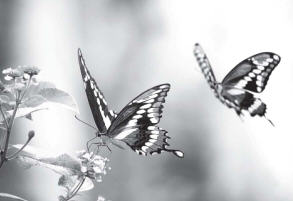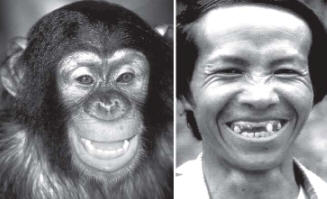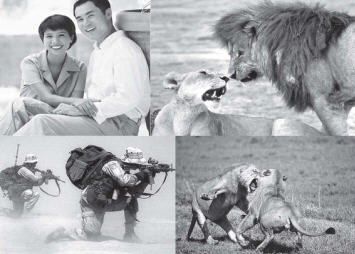Real happiness is more than the happiness enjoyed by animals.
This is the first in a series of six articles that will deal with understanding happiness and how to obtain it.

A king enquired from a learned sage, “I often wonder what happiness really is. O enlightened one, could you please reveal to me the secrets of happiness?” The sage cast his merciful glance upon the king and said, “Dear king, happiness is simply a butterfly.” The king, confused by the cryptic answer, probed further, to which the revered sage smiled and said, “Very soon, O King, it will be revealed to you.” The sage then departed, leaving the king confused about the mysterious wisdom he had just heard.
A few days later as the king relaxed in his royal garden, he saw a butterfly resting on a leaf. Intrigued by the sage’s wisdom that he had pondered upon, he carefully went behind to catch the butterfly. As soon as he moved his hand, the butterfly flew away and landed on another plant. The king pursued the butterfly, but each time the insect slipped away to another leaf, flower or a plant. A little later, the king, exasperated by his unsuccessful attempts, resigned to his seat. As he closed his eyes, he felt a slight itch on his arm. Slowly he opened his eyes and, lo and behold, the same butterfly now rested on his arm. He was amazed, and just then a special realization gushed forth in his heart, “Yes, the sage was indeed right. Happiness is a butterfly, for when we intensely search after it, it eludes us and when we least expect it, we receive it.”
Similarities between humans and animals
To explore higher and deeper levels of happiness, we need to understand that humans are a very special species in God’s creation, and they are capable of experiencing a much more satisfying and purposeful life. Let us first examine the similarities and differences between humans and animals.
The Mahabharata, an ancient Indian scripture, highlights the similarities that form the acronym SEED:
ahara-nidra-bhaya-maithunam ca
samanyam etat pasubhir naranam
dharmo hi tesam adhiko viseso
dharmena hinah pasubhih samanah
Nidra means “sleeping,” ahara refers to “eating,” maithuna is “sex life or enjoyment,” and “bhaya” is “defending.” (Thus the acronym SEED is indicative of these four similarities between animals and humans) We can examine each of these four more elaborately.
The SEED of Humans and Animals

While animals eat raw, uncooked food, without complaint, humans thrive on a variety of foodstuffs. And they can get fussy about it too. Yet we observe that the propensity and experience of eating is similar to both. However it is the humans who have degraded to lower than animals in their eating propensities. While on one hand we have a rich inter-continental cuisine, on the other hand humans also experiment with foods that are unnatural to the human body. A friend of mine in Singapore had a Chinese lady secretary who sipped on monkey blood during her office breaks. She also feasted on roasted snakes as her favorite delicacy. Multinational companies spend millions of dollars on research to improve the nutrient content of chocolates, potato wafers or corn flakes all in pursuance of the glorious activity of eating.
Sleeping isn’t a problem for animals. They sleep anywhere without an alarm to wake them. Sleeping isn’t a problem for the animals. Humans have plush apartments and expensive bedrooms, and even special water beds have been designed to help them experience a sound sleep. Once we are fast asleep, it doesn’t matter if we are lying on the road or resting on an attractive bed. The experience of sleeping, the Mahabharata declares, is the same for a human and an animal.
Humans, however, spend a great amount of energy, time and money figuring out how to get good, undisturbed sleep. Special alarm clocks have been designed that compel even the most die-hard sleeper to wake up. One such chicken-shaped alarm clock rings, making the eggs fall off the clock. The loud noise of the alarm is accompanied by the scattering of eggs. One has to collect all the eggs and put them back inside the clock to stop its ringing. The rationale behind it is that by the time one finishes the task, his sleepiness has gone. Another alarm clock is shaped like a fan. The moment it goes off, it also flies all over the room. One has to wake up and catch the fan with great endeavor. This amounts to a good workout until one finally manages to turn it off. By then, one fully awake.
German scientists have created a special bed that is super-programmed through latest software technology. For example, if one plans to wake up at three in the afternoon but desires to experience a sunrise, this bed will create a pleasing sound of bird song and a fragrance of early morning flowers. The bed guarantees to wake up a sound sleeper with water aimed at the eyes of the sleeper. If one still doesn’t get up, the bed has an eject system that will throw the person out, thus ensuring that he is fully awake.

Human intellect has also discovered sleep-enhancers and drugs that induce sleep; even a diehard insomniac can take those medications and experience sound sleep. It’s amazing how animals on the other hand can sleep anywhere at any time. Thus we see that the precious human intelligence has been channeled to experience pleasures that are easily met by the animals.
Enjoyment primarily refers to sex life. Animals do it on the street. Humans have a sophisticated set up of courtship and they go through a lot of struggle and emotional complexities as they seek to fulfil gross carnal pleasures.
Defending is the fourth similarity between humans and animals. While animals defend with their claws, humans have metal detectors, special locks, bank insurances, security men, buzzer alarms, and enormous defense expenditures.
Thus we can see humans and animals pursue similar goals. However intuitively we know humans are special. What makes humans special vis-a-vis the animals? The answer to this question will help us discover newer and richer happiness.
To be continued…. How are Humans special?
Vraja Vihari Dasa holds a master’s degree in International Finance and Management (MBA). He serves as a full-time resident devotee at ISKCON Chowpatty and teaches Krishna consciousness to students at universities. He also conducts devotional seminars and training programs for the temple’s congregation members.
